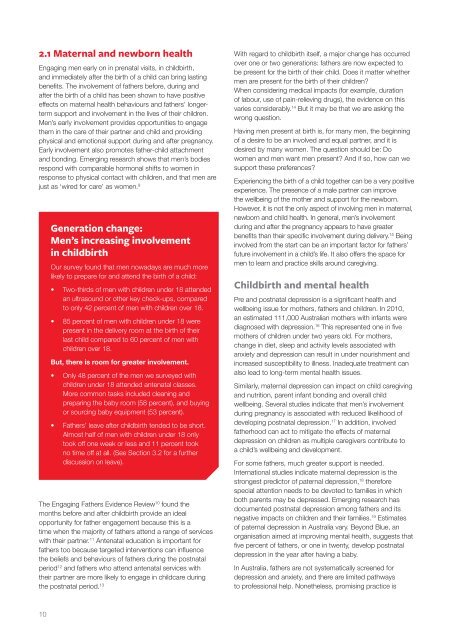State of Australia’s Fathers
1iGWp7w
1iGWp7w
- No tags were found...
Create successful ePaper yourself
Turn your PDF publications into a flip-book with our unique Google optimized e-Paper software.
2.1 Maternal and newborn health<br />
Engaging men early on in prenatal visits, in childbirth,<br />
and immediately after the birth <strong>of</strong> a child can bring lasting<br />
benefits. The involvement <strong>of</strong> fathers before, during and<br />
after the birth <strong>of</strong> a child has been shown to have positive<br />
effects on maternal health behaviours and fathers’ longerterm<br />
support and involvement in the lives <strong>of</strong> their children.<br />
Men’s early involvement provides opportunities to engage<br />
them in the care <strong>of</strong> their partner and child and providing<br />
physical and emotional support during and after pregnancy.<br />
Early involvement also promotes father-child attachment<br />
and bonding. Emerging research shows that men’s bodies<br />
respond with comparable hormonal shifts to women in<br />
response to physical contact with children, and that men are<br />
just as ‘wired for care’ as women. 9<br />
Generation change:<br />
Men’s increasing involvement<br />
in childbirth<br />
Our survey found that men nowadays are much more<br />
likely to prepare for and attend the birth <strong>of</strong> a child:<br />
• Two-thirds <strong>of</strong> men with children under 18 attended<br />
an ultrasound or other key check-ups, compared<br />
to only 42 percent <strong>of</strong> men with children over 18.<br />
• 85 percent <strong>of</strong> men with children under 18 were<br />
present in the delivery room at the birth <strong>of</strong> their<br />
last child compared to 60 percent <strong>of</strong> men with<br />
children over 18.<br />
But, there is room for greater involvement.<br />
• Only 48 percent <strong>of</strong> the men we surveyed with<br />
children under 18 attended antenatal classes.<br />
More common tasks included cleaning and<br />
preparing the baby room (58 percent), and buying<br />
or sourcing baby equipment (53 percent).<br />
• <strong>Fathers</strong>’ leave after childbirth tended to be short.<br />
Almost half <strong>of</strong> men with children under 18 only<br />
took <strong>of</strong>f one week or less and 11 percent took<br />
no time <strong>of</strong>f at all. (See Section 3.2 for a further<br />
discussion on leave).<br />
The Engaging <strong>Fathers</strong> Evidence Review 10 found the<br />
months before and after childbirth provide an ideal<br />
opportunity for father engagement because this is a<br />
time when the majority <strong>of</strong> fathers attend a range <strong>of</strong> services<br />
with their partner. 11 Antenatal education is important for<br />
fathers too because targeted interventions can influence<br />
the beliefs and behaviours <strong>of</strong> fathers during the postnatal<br />
period 12 and fathers who attend antenatal services with<br />
their partner are more likely to engage in childcare during<br />
the postnatal period. 13<br />
With regard to childbirth itself, a major change has occurred<br />
over one or two generations: fathers are now expected to<br />
be present for the birth <strong>of</strong> their child. Does it matter whether<br />
men are present for the birth <strong>of</strong> their children?<br />
When considering medical impacts (for example, duration<br />
<strong>of</strong> labour, use <strong>of</strong> pain-relieving drugs), the evidence on this<br />
varies considerably. 14 But it may be that we are asking the<br />
wrong question.<br />
Having men present at birth is, for many men, the beginning<br />
<strong>of</strong> a desire to be an involved and equal partner, and it is<br />
desired by many women. The question should be: Do<br />
women and men want men present? And if so, how can we<br />
support these preferences?<br />
Experiencing the birth <strong>of</strong> a child together can be a very positive<br />
experience. The presence <strong>of</strong> a male partner can improve<br />
the wellbeing <strong>of</strong> the mother and support for the newborn.<br />
However, it is not the only aspect <strong>of</strong> involving men in maternal,<br />
newborn and child health. In general, men’s involvement<br />
during and after the pregnancy appears to have greater<br />
benefits than their specific involvement during delivery. 15 Being<br />
involved from the start can be an important factor for fathers’<br />
future involvement in a child’s life. It also <strong>of</strong>fers the space for<br />
men to learn and practice skills around caregiving.<br />
Childbirth and mental health<br />
Pre and postnatal depression is a significant health and<br />
wellbeing issue for mothers, fathers and children. In 2010,<br />
an estimated 111,000 Australian mothers with infants were<br />
diagnosed with depression. 16 This represented one in five<br />
mothers <strong>of</strong> children under two years old. For mothers,<br />
change in diet, sleep and activity levels associated with<br />
anxiety and depression can result in under nourishment and<br />
increased susceptibility to illness. Inadequate treatment can<br />
also lead to long-term mental health issues.<br />
Similarly, maternal depression can impact on child caregiving<br />
and nutrition, parent infant bonding and overall child<br />
wellbeing. Several studies indicate that men’s involvement<br />
during pregnancy is associated with reduced likelihood <strong>of</strong><br />
developing postnatal depression. 17 In addition, involved<br />
fatherhood can act to mitigate the effects <strong>of</strong> maternal<br />
depression on children as multiple caregivers contribute to<br />
a child’s wellbeing and development.<br />
For some fathers, much greater support is needed.<br />
International studies indicate maternal depression is the<br />
strongest predictor <strong>of</strong> paternal depression, 18 therefore<br />
special attention needs to be devoted to families in which<br />
both parents may be depressed. Emerging research has<br />
documented postnatal depression among fathers and its<br />
negative impacts on children and their families. 19 Estimates<br />
<strong>of</strong> paternal depression in Australia vary. Beyond Blue, an<br />
organisation aimed at improving mental health, suggests that<br />
five percent <strong>of</strong> fathers, or one in twenty, develop postnatal<br />
depression in the year after having a baby.<br />
In Australia, fathers are not systematically screened for<br />
depression and anxiety, and there are limited pathways<br />
to pr<strong>of</strong>essional help. Nonetheless, promising practice is<br />
10


